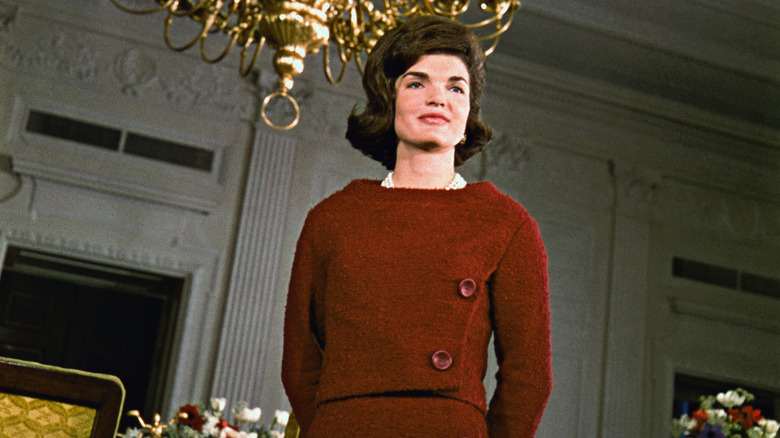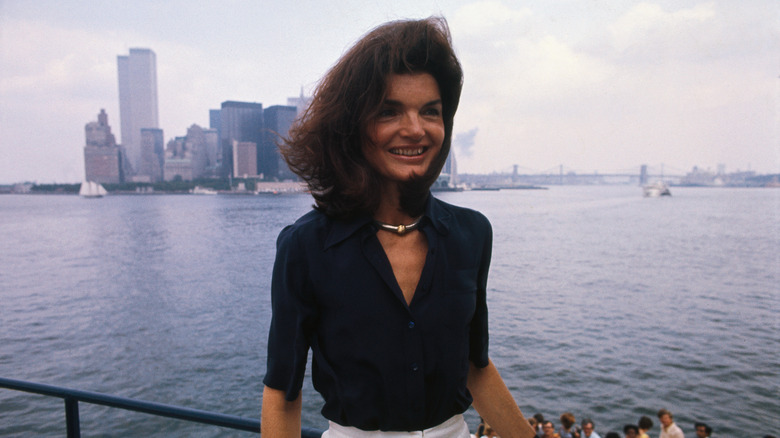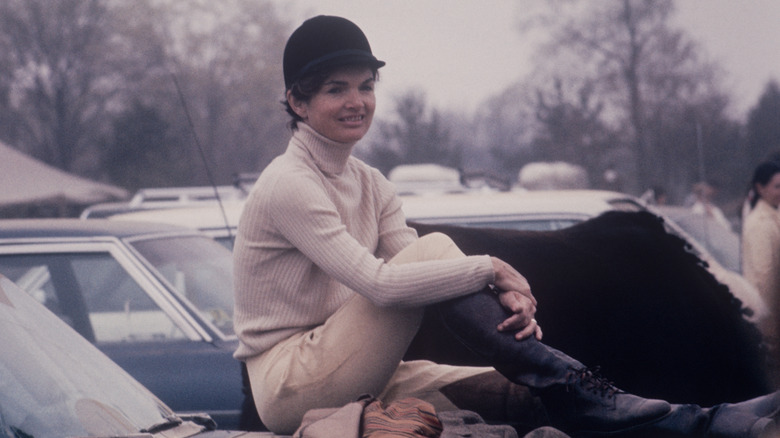The Gift That Set Jackie And JFK's Romance Into Motion
Many of us know Jackie Kennedy as the former First Lady of the United States. But before she took on the title, Jackie O. had a unique, often overlooked past. For a young woman in the '50s, the options were limited, but she chose to pave her own path. After returning from a solo trip to Europe, Kennedy would stop at nothing to study in Paris for her junior year. But before she began her journey, she wanted her mother, Janet, to buy her an expensive camera. However, she refused, so Kennedy turned to her father, who would do anything to anger his ex-wife, and he got her the camera she wanted.
Jackie O. became inseparable from her camera. It was her companion when she took some forbidden pictures of a government building in Vienna. She even tried to use the camera to get a shot of the Mona Lisa before getting kicked out of the Louvre. Kennedy used the camera as an entry ticket to fashion shows where she pretended to be a journalist until she actually became one.
When she arrived for her interview with Frank C. Waldrop, editor at the Washington Times-Herald, he blatantly asked her if she was passing time until marriage or if she wanted a career, and Kennedy firmly replied that it was the latter. Initially, Waldrop lacked confidence in her life goals, so he made Kennedy perform menial tasks until she convinced him to give her a column. And eventually, she ended up interviewing John F. Kennedy.
Jackie Kennedy was a career gal through and through
When Jackie Kennedy picked up the column, it was entitled "Inquiring Photographer," but she was so good at her job that it was soon renamed to "Inquiring Camera Girl." For this column, she wandered around the city asking people the same question and even drew cartoons to get her point across better. And Jackie O. had no reservations about whom she interviewed; she spoke to everybody from truck drivers to Vice President Richard Nixon. Kennedy also questioned people about everything from politics to pop culture.
Eventually, she was allowed to cover important topics like the coronation of Queen Elizabeth II and the first inauguration of Dwight D. Eisenhower. Despite the general outlook at the time, Kennedy wasn't initially interested in marriage. As Carl Sferazza Anthony, author of her biography, "Camera Girl," informed CBS, "She had a rather dim view of marriage. She felt very strongly, even as a young woman in the early 1950s, she should not marry before she had somehow established herself."
In letters she wrote as a teenager, Kennedy admitted that she couldn't imagine being condemned to the fate of a small-town housewife who had to make her cake look the prettiest for local competitions (via CNN). Before John F. Kennedy entered her life, she almost married John Husted Jr. but broke off the engagement when she found out he wasn't making enough money. And despite how everything went down, she didn't regret her decision.
The former first lady held a job until her death
It's rare to see a former first lady working a regular, paying job following her White House tenure, but Jackie Kennedy broke the stereotype. Although she didn't have much publishing experience, Jackie O. joined Viking Press as a consulting editor following her second husband's death. Initially, she intended to join as an editor, but the company's president, Thomas Guinzburg, wasn't sure she could survive in the highly competitive atmosphere among seasoned editors. When Kennedy quit her job at the Washington Times-Herald, she made $42.50 a week, but nearly two decades later in 1975, she only made $200 weekly.
Despite being a prominent figure at the time, Kennedy didn't want special treatment. She attended meetings, queued for the copier, and made her own coffee. However, Jackie O. quit two years later when they published "Shall We Tell the President?" a novel about the assassination of her brother-in-law, Ted Kennedy. She later joined Doubleday as a senior editor. There, Kennedy worked on several iconic projects and earned a reported $100,000 a year.
She convinced Michael Jackson to create his ghost-written autobiography "Moon Walk." Her worklife created somewhat of a media frenzy because it was rare to see a historical figure get a normal job, but she tried to ensure that the book's focus remained on Jackson. Despite struggling with the effects of chemotherapy and late-stage cancer, Kennedy continued to work with the agency until she died in 1994.


